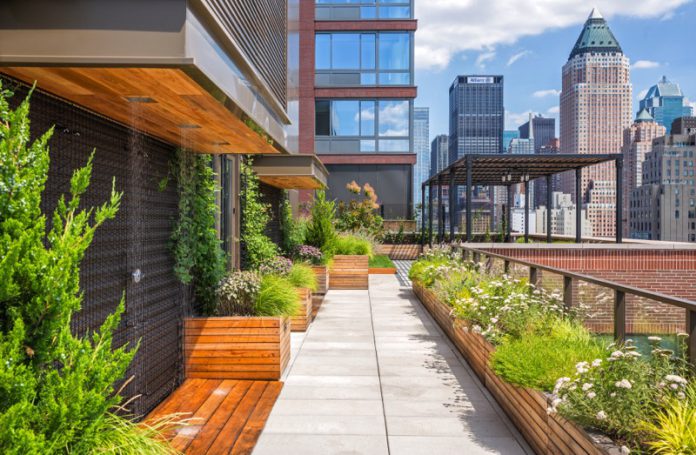Urbanisation has been on the rise for decades, painting our cities with concrete buildings and asphalt roads. Amidst this concrete jungle, a revolution is taking place, turning these urban spaces green and vibrant – the advent of rooftop gardens.
Rooftop gardens, also known as green roofs, are not only aesthetically pleasing but also packed with numerous benefits. From environmental to economic and social advantages, rooftop gardens are a symbol of urban sustainability.
An Oasis Amidst the Urban Desert
Put simply, rooftop gardens bring nature to places where it is otherwise hard to find. They convert barren rooftops into lively green spaces where people can unwind, creating pockets of tranquillity in the bustling city.
These gardens also help to reduce the urban heat island effect, a phenomenon where urban areas are significantly warmer than their rural surroundings due to human activities. Green roofs can lower this effect by cooling buildings and their surroundings, providing a comfortable microclimate in densely populated cities.
A Contribution to Environmental Sustainability
Rooftop gardens excel in terms of environmental sustainability. They contribute to the reduction of greenhouse gases by absorbing CO2 and releasing oxygen – this is critical in urban environments where emissions are high.
The green cover of rooftop gardens also improves air quality. Plants act as natural filters, trapping pollutants and particulate matter, thus providing cleaner and healthier air.
Furthermore, rooftop gardens help in stormwater management. They absorb rainwater, reducing the amount of runoff and delaying the time it reaches the streets. This aids in preventing sewer overflows and reducing the risk of flooding.
A Boost to Energy Efficiency
One of the most tangible benefits of rooftop gardens is their contribution to energy efficiency – they act as natural insulators, reducing the need for heating in winter and cooling in summer. This leads to significant energy savings and a decrease in carbon footprint.
A study by the National Research Council of Canada found that a green roof can reduce summer energy demand by over 75%. The energy savings, in turn, translate to cost savings, making rooftop gardens a smart and sustainable investment.
Enhancing Urban Biodiversity
Urban environments are often perceived as hostile habitats for wildlife. However, rooftop gardens can help alter this narrative. They can serve as habitats for various species, enhancing urban biodiversity. These spaces can attract birds, bees, butterflies, and other beneficial insects, contributing to a more balanced and resilient urban ecosystem.
Designing a Rooftop Garden: Tips and Best Practices
When it comes to designing a rooftop garden tips, the practice is both an art and a science. From choosing the right plants to considering load-bearing capacity, here are a few key factors to consider.
- Evaluate the Structure: Before you start, it’s crucial to assess your building’s structural capacity. Ensure that the roof can support the additional weight of the garden, including the soil, plants, and water.
- Choose the Right Plants: Depending on your local climate, choose plants that are resistant to wind, sun, and drought. Succulents, grasses, and certain perennial flowers are usually suitable for rooftop conditions.
- Consider Irrigation and Drainage: Rooftop gardens require efficient irrigation and drainage systems to prevent water logging and ensure that plants get adequate water.
- Plan for Accessibility: Make sure your garden is easily accessible for maintenance. Consider adding pathways and ensure there’s a system in place for transporting materials to and from the rooftop.
- Incorporate Amenities: If space allows, consider adding seating areas, pergolas, or even an outdoor kitchen to make the space more functional and inviting.
- Consult Professionals: If in doubt, consult a professional. Landscape architects, engineers, and green roof professionals can provide valuable advice and ensure that your rooftop garden is both safe and sustainable.
Invest in a more sustainable future, with a rooftop garden
Rooftop gardens are transforming our cities, turning grey into green, and concrete into lush canopies. They are more than just a trend – they are an answer to many of the sustainability challenges our urban spaces face today. By embracing this concept, we can create healthier, greener, and more liveable cities. Let’s take the path to greening urban spaces and enhancing sustainability, one rooftop at a time.

